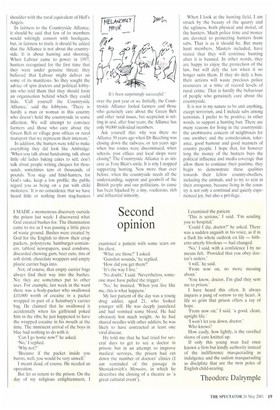Second opinion
I MADE a momentous discovery outside the prison last week: I discovered what God created bushes for. The illumination came to me as I was passing a little piece of waste ground. Bushes were created by God for the English to throw their crisp packets, polystyrene hamburger-containers, tabloid newspapers, used condoms, discarded chewing gum, beer cans, tins of soft drink, chocolate wrappers and empty plastic carrier bags into.
Not, of course, that empty carrier bags always find their way into the bushes. No; they are sometimes put to other uses. For example, last week in the ward there was a body-packer who swallowed £10,000 worth of cocaine in a packet wrapped in part of a Sainsbury's carrier bag. He claimed that he swallowed it accidentally when his girlfriend poked him in the ribs; he just happened to have the wrapped cocaine in his mouth at the time. The imminent arrival of the boys in blue had nothing to do with it.
Van I go home now?' he asked.
'No,' I replied.
'Why not?'
'Because if the packet inside you bursts, well, you would be very unwell.'
I meant dead, of course. He needed an operation.
But let us return to the prison. On the day of my religious enlightenment. I examined a patient with some scars on his chest,
'What are those?' I asked.
'Gunshot wounds,' he replied.
'How did you get them?'
'It's the way I live.'
'No doubt,' I said. 'Nevertheless, someone must have pulled the trigger.'
'No,' he insisted. 'When you live like me, this is what happens.'
My last patient of the day was a young drug addict, aged 21, who looked younger still. He was deeply jaundiced and had vomited some blood. He had obviously lost much weight. As he had shared needles with other addicts, he was likely to have contracted at least one viral disease.
He told me that he had tried for several days to get to see a doctor in prison: but in an attempt to improve medical services, the prison had cut down the number of doctors' clinics (I am reminded of the passage in Shostakovich's Memoirs, in which he describes the closing of a theatre as 'a great cultural event').
I examined the patient.
'This is serious,' I said. 'I'm sending you to hospital.'
'Could I die, doctor?' he asked. There was a sudden anguish in his voice, as if in a flash his whole outlook on life — hitherto utterly frivolous — had changed.
'No,' I said, with a confidence I by no means felt. 'Provided that you obey doctor's orders.'
'I will.' he said.
'From now on, no more messing about.'
'You know, doctor, I'm glad they sent me to prison.'
I have heard this often. It always imparts a pang of sorrow to my heart. A life so grim that prison offers a ray of hope.
'From now on,' I said, 'a good, clean, upright life.'
'I won't let you down, doctor.'
Who knows?
How easily, how lightly, is the ravelled sleave of care knitted up.
If only this young man had once known a firm but kindly authority instead of the indifference masquerading as indulgence and the sadism masquerading as discipline that are the twin poles of English child-rearing.
Theodore Dalrymple


















































































 Previous page
Previous page